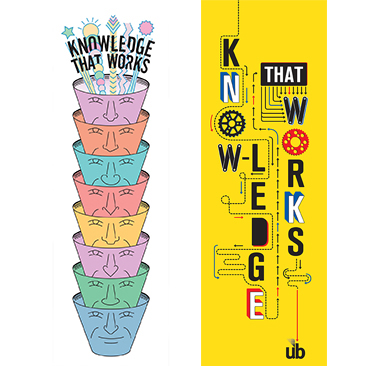How to Survive a Zombie Apocalypse and Other Stories: Pop Culture in the Classroom?
Category: Features

This past fall’s media, um, feeding frenzy surrounding the University’s CMAT 333: Media Genres course, Zombies, has raised some eyebrows (along with the dead), and both support for and criticism of the topic popped up in newspapers, on television and throughout the Web’s blogosphere. After UB’s first semester of offering a minor in pop culture, along with those in eight other areas, we examine the pros and cons of bringing popular culture into the classroom. Fill us in: Contact the Office of Alumni Relations at 410.837.6131 or alumni@ubalt.edu.
If you squint from the back of the auditorium in UB’s Liberal Arts and Policy Building, you can just make out that the red pattern on the instructor’s short-sleeve black shirt is actually a series of skulls. And the black-and-white film the adjunct faculty member, Arnold T. Blumberg, M.A. ’96, D.C.D. ’04, has projected onto the giant screen at the front of the room is actually a classic zombie motion picture. While this may seem anything but classroom-like, Blumberg is actually describing how the film’s major plot points echo sentiments related to post-World War II McCarthyism, and a student raises his hand to launch a discussion of parallels between the zombie story and Jane Austen’s novels.
The auditorium is nearly full—making this, CMAT 333: Media Genres, an unusually large class by UB standards, where the student-faculty ratio hovers around 19-to-1. Over in the corner is a BBC camera operator, as the media has picked up on this quirky classroom story, presenting it in a variety of twists on “The University of Baltimore Teaches Students How to Survive a Zombie Apocalypse.” Coverage has ranged from the Associated Press, The Washington Post and The (Baltimore) Sun to MSNBC and ABC. The University also received communication from students around the world, inquiring if the course would be available online.
Reactions haven’t been positive across the board, however. Some, like a blog posting on the Young America’s Foundation website that states, “We are not sure how [the course] qualifies students to be more productive member [sic] of society,” are downright critical.
“One of the things the media did that was not a favor was immediately dubbing the class ‘Zombies 101,’” says Blumberg, who is also the co-author of Zombiemania: 80 Movies to Die For. “But the fact is, the course is Media Genres, and every semester the course is offered, it can focus on any number of topics from, say, the Cold War films of the ’50s to a look at how the Old West has evolved in our entertainment. It just so happens that right now we’ve picked what is, in fact, one of the most pervasive and most popular symbols in horror entertainment today, which is the zombie.”

Maureen Sullivan, an undergraduate student in the Simulation and Digital Entertainment program, embraces the zombie theme of this past fall’s CMAT 333: Media Genres course.
The course supports UB’s minor in popular culture, one of nine minors made available to students for the first time in fall 2010. The rationale for the minor, as described in the proposal submitted last year to the University provost, is: “Students ... will learn to read, interpret, critique, and utilize various media in order to become more savvy consumers of popular culture. … Along the way, students will learn about the historical, social, business, and governmental forces that affect popular culture, as well as the psychological motivations for embracing or rejecting aspects of popular culture.”
While it’s a new area of study for UB, popular culture studies in academia date back to the late 1960s, says Gary Hoppenstand, editor in chief of The Journal of Popular Culture and professor of American studies at Michigan State University. Bowling Green State University in Ohio has an entire academic department and a supporting research center devoted to popular culture, and there is a Popular Culture Association/American Culture Association that supports “scholars and enthusiasts” through conferences, awards and grants.
“It’s important to study one’s culture so that one can understand how it operates, and knowledge is power,” Hoppenstand says. “The point of popular culture studies is not to replace our fine art or our fine literature; it’s intended to supplement and complement it and broaden our understanding of the human experience.”
Of course, you have to be able to define it before you can study it, and that can be tricky. What exactly is popular culture? Is it Andy Warhol and Campbell’s tomato soup? Twitter and Facebook? Reality television and 3-D blockbusters?
Hoppenstand says definitions can run the gamut between two schools of thought: “Popular culture is mass media culture; it has to be mass produced, mass consumed,” he says of one definition. The other view argues that popular culture is significantly more pervasive than mass culture, Hoppenstand explains, saying, “It’s like water to a fish, the culture of everyday life.” This would include rituals, food and clothing, things as fundamental as ancient Roman or Chinese artifacts, he adds.
Charity Fox, assistant professor in UB’s School of Communications Design, says, “I see popular culture as being this really interesting marriage of commerce and art, because popular culture is meant for commercial purposes very often.” Fox will teach a different Media Genres topic this spring, exploring action-adventure through film, television and literature, including Rocky, Rambo, The A-Team and more modern fare like 24 and The Expendables. “[The genre] draws from a lot of political issues; a lot of fear comes out through action-adventure,” Fox explains. She wants her students to gain “an understanding of the assumptions of race, gender, class and politics that go into action-adventure as a genre.”
Still, she doubts her class will garner the same worldwide attention that the zombie topic has, despite her course doing what the study of popular culture does best, she says: encouraging “lifelong learners.” “There’s a lifelong interaction with popular culture, and learning how to study it critically and looking at it from an interdisciplinary aspect begins to integrate lots of things in life,” she explains. “It helps people take a critical eye to everything they encounter instead of separating out ‘this is where I criticize things’ and ‘this is where I just enjoy them.’ You can enjoy them and still look at them critically.”

Enjoyment is precisely why Gina Finelli, assistant dean of undergraduate studies and sociology professor in UB’s Yale Gordon College of Arts and Sciences, says popular culture is an ideal way to engage students in their studies. “It’s a way for [students] to understand society [because it’s] easy for them to access information, to provide examples and to see real relevance in their lives,” she says.
Finelli helped develop a pop culture-themed learning community—a set of thematically linked classes for freshmen—called Keeping Up With the Joneses at UB. “[Freshmen] may not have as many life experiences, but they do know popular culture, so they can use something in their real lives and examine it in a more theoretical way and understand larger issues of society and complexities of culture,” she says.
This spring, she’ll offer the learning community through the University’s UB+ Adult Learners program, a first-year college experience for adults who have been out of high school for at least three years—and this population may have their own perspectives on popular culture. “I think their lens is different,” Finelli says. “But the lens is always going to be different for different students. … Their examples are going to be from their experiences, which are probably from a different time period. But they’re also aware of things that are happening today.”
And what’s happening today with popular culture mirrors what was happening centuries ago, Blumberg says. “The very fact that we have a canon of classic literature seems to suggest to some people that there’s a distinction between [high culture] and our pop culture today, when the fact of the matter is that [classic] writers like Shakespeare and Dickens would be writing television [were they alive today],” Blumberg says, explaining that they were authoring what was considered popular culture at the time. “And hundreds of years from now, our pop culture will be a canon of its own that we’ll be looking back to. But it’s more important to look at it now, in the present while it’s inundating everyone, to see what it says about us.”
Hoppenstand says mentioning Shakespeare and Dickens is how he defuses those who attack his field of study as nonacademic. “I understand the people who attack it,” he says. “There’s a lot in popular culture that can be unpleasant or uncomfortable. But understanding, for example, the media frenzy around Lindsay Lohan is important, because it shows how media can manipulate us.”
And speaking of the media, Blumberg says of the hubbub surrounding his class, “Hopefully, what we accomplish with it is to throw a spotlight on this very idea of taking a look at pop culture in an academic setting.”
POPULAR OPINION
We know that more than 40 current UB students had their curiosities piqued enough to enroll in the CMAT 333: Media Genres class focusing on zombies this past semester. But we went to those not enrolled—and to our alumni—to ask their opinion about the class and about the place of popular culture in higher education. In their own words …
Should popular culture be offered as an academic subject matter in higher education?
“Yes, as long as it is used as a metaphor for educating about a higher, universal issue or topic. I think UB needs to carefully benchmark this idea versus competitor institutions and consider the message this sends to the market. Does it make UB look hip and contemporary or silly and frivolous? Does it diminish the actual quality of the education? Would and do other respected universities have the same sort of classes?”
–Robyn T. Costello, M.A. ’96 (publications design)
[Editor’s note: For articles about popular culture classes at universities across the country, see the
WebExtra
.]
“Yes, because popular culture is becoming increasingly important. Plus, a lot of fields such as journalism and graphic design rely on popular culture to sustain their industry.”
–Jamere Johnson, junior, simulation and digital entertainment
“Yes. As a marketing major, I believe pop culture would help me better understand how media influences sales of products.”
–Janey Partin, freshman, business administration, marketing specialization
“Yes, it should. It helps us students develop more knowledge and critical thinking.”
–Sumit Patel, senior, management information systems
If the CMAT 333: Media Genres course, Zombies, were to be offered again and you could enroll, would you?
“Yes, because a zombie apocalypse is unavoidable.”
–Darryl Brown, junior, business administration, accounting specialization
“Yes, zombies are freaking awesome and they impact our society in movies and books. They’ve been a part of world culture forever.”
–Amber Evans, freshman, English, creative writing specialization
“I would not be interested in taking this class. I feel that social skills are much more practical and essential than knowing the popular culture or the latest technology. As a former recruiter, I would not view the applicant favorably if she or he got an A in the media genres topic [of] zombies or in popular culture, unless she or he is in graphic design or an arts-related field.”
–T. Louise Hsu, M.S. ’01 (business)
WebExtras

How to Survive a Zombie Apocalypse and Other Stories: Pop Culture in the Classroom?
: Check out some more photos from the UB bee's big event—in which he was given his new nickname, Eubie.

